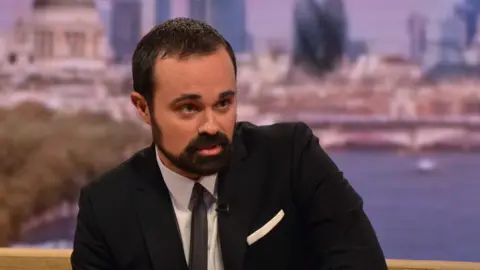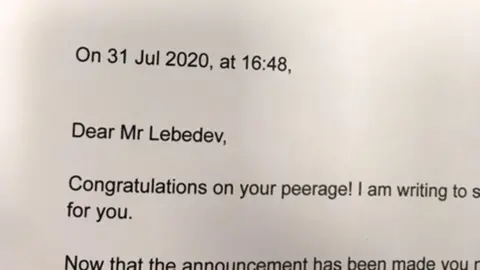Evgeny Lebedev: Ministers withhold security advice over Lords seat
 BBC
BBCThe government is withholding security advice on Evgeny Lebedev's peerage on "national security" grounds.
MPs voted in March to force the publication of secret documents, amid claims the security services had raised concerns about the Russian-born mogul.
But the Cabinet Office has released only limited information to comply with the demand.
Labour accused the government of a "cover-up" and called on them to "come clean".
Lord Lebedev has denied posing a "security risk" to the UK, and said after MPs backed Labour's demand for full disclosure that he had "nothing to hide".
Prime Minister Boris Johnson has denied intervening over Lord Lebedev's peerage, after reports security services changed their advice after he got involved.
Lord Lebedev, who has dual Russian and British nationality, is the son of a former KGB spy. He moved to the UK as a child and owns the The Independent and London Evening Standard newspapers.
He became a non-party, crossbench peer in July 2020, after being nominated by Mr Johnson for philanthropy and services to the media.
Labour's motion called on the government to publish documents about Lord Lebedev's appointment it had received from, or given to, the House of Lords Appointment Committee (HOLOC), which vets peerage nominations.

The government responded on Thursday, but only released the form Lord Lebedev was required to fill in by HOLOC, a document announcing his appointment, a list of other peerages awarded at the time, and a letter congratulating him on the news.
In a statement, Cabinet Office Minister Michael Ellis said what it had published "reflects the need to protect national security".
Mr Ellis added that Lord Lebedev was a "man of good standing" and "no complaint has been made about his personal conduct".
He said the government had sent a separate response to Parliament's Intelligence and Security Committee, which scrutinises the UK's security services.
Revealing that the committee had made a disclosure request of its own, he argued this meant the government was "acting in good faith" in response to Parliament's request for information.
Shortly afterwards, the committee confirmed it has received a reply to its request on Wednesday - but added it was too soon to say "whether the information provided is sufficient".
The committee said it was "surprised" by Mr Ellis's statement divulging its demand, adding this "should have remained a private - and classified - matter".

Evgeny Lebedev is a friend of the prime minister and newspaper proprietor. He says he is a proud British citizen and not a security risk.
But claims that the security services raised concerns about him getting a peerage have been around for months. Dominic Cummings made them public, another source raised them with the BBC.
But what actually happened and what were those concerns? If these documents have been published, they might have shown us.
Labour is furious and thinks the heavy redactions are sign of a cover-up.
The government has said it needed to respect confidentiality and protect national security.
They have the backing of the chair or the Lords Appointments Committee who has also said the confidentiality of the system is crucial.
But in publishing such limited information today, ministers stand accused of ignoring what parliament voted for in March.

The intelligence committee - made up of eight MPs and one peer - holds evidence sessions in private with ministers, security officials and academics about the activities of the security services.
It can also compile reports - although under the 2013 legislation governing how the committee operates, these can only be published after they have been vetted by the prime minister himself.
Labour's deputy leader Angela Rayner accused ministers of not complying with Parliament's demands. She said the Labour Party would "take steps to rectify this contempt of Parliament".
She added: "This looks like a cover-up and smells like a cover-up because it is a cover-up.
"If the prime minister is claiming he wasn't involved in forcing through the award of a peerage to an individual of concern to our intelligence services, he should come clean and publish the documents as Parliament instructed."
She later described what the government had published as having "been so heavily redacted it is utterly pointless".
Lord Bew, who chairs HOLOC, has denied any interference to his committee's process, telling MPs last month "there was no pressure on this issue from No 10 or the prime minister".
Labour's motion to force publication of documents was made as a so-called "Humble Address", an obscure parliamentary procedure employed by the party to get hold of Brexit material in 2017.
The government had missed a deadline to respond by the suspension of Parliament last month, arguing more time was needed to deal with "all the necessary considerations".
